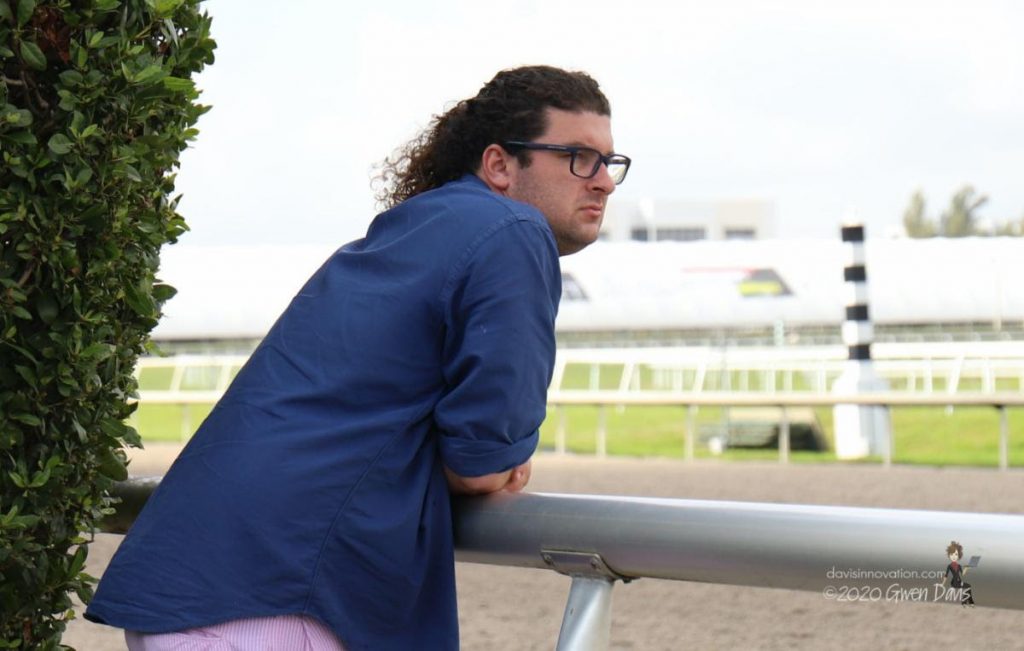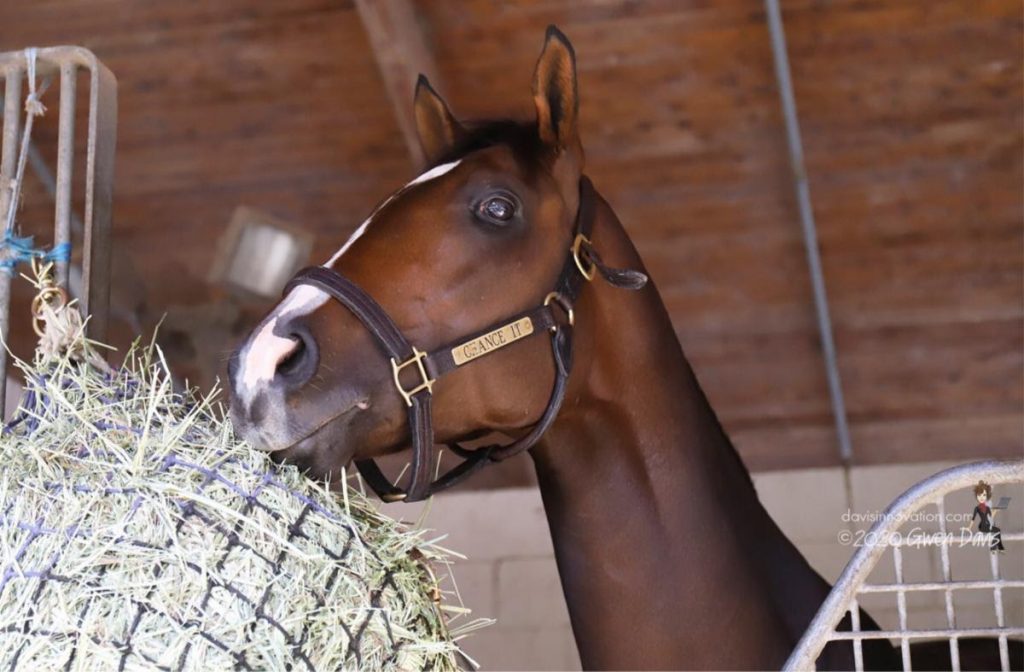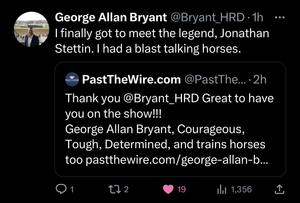
Further proof that horse racing is most democratic of sports
Saffie Joseph Jr. Photo by Gwen Davis/ Davis Innovation
By: Gary West
Go on a pilgrimage, throw a dart and dream. Indulge in a dream that’s thunderous with cheers and redolent with roses, a dream that invites immersion and demands dedication, one that scintillates with complexity and possibility and, in the end, joy. That, as much as anything, is what horse racing is about, its capacity to inspire dreams.
“In racing you have to have a dream,” said Saffie Joseph, Jr., who’ll saddle Chance It in Saturday’s Fountain of Youth Stakes at Gulfstream Park in Hallandale Beach, Fla. “If you don’t have a dream, this game will bury you.”

Davis Innovation
The dream brought Joseph here from St. James, Barbados, just as it brought Jeremiah O’Dwyer here from County Tipperary, Ireland. O’Dwyer will saddle Shotski in the Fountain of Youth. But each of the 12 horses in the race represents a dream of some sort — a dream of going on to the Kentucky Derby perhaps or maybe a more modest dream of simply competing in a major stakes race at Gulfstream Park. Every racehorse is a dream. From the first moment a foal pushes himself up from his straw bedding and stands on wobbly legs to nurse, he represents somebody’s dream, and even if modestly bred and inconspicuously reared, that racehorse has a chance to realize a dream. Go ahead, chance it.
That, Joseph said, is what separates horse racing from all other sports: “That’s what makes horse racing so intriguing.” More than any other endeavor or sport, horse racing has an incomparable capacity for engendering hope and inspiring dreams, and this is the time of year when it beckons most alluringly.
And so they come to the racetrack, to Gulfstream Park, like Chaucer’s pilgrims to Canterbury, but not with tales, or not only tales, but also with their hopes and dreams. Joseph dreamed of becoming a successful, world-class trainer and taking a horse to the Kentucky Derby. Just consider what an extraordinary dream that was for a young man in the Lesser Antilles of the West Indies, even for someone who at the age of 22 swept the Barbados Triple Crown. Yes, that was an achievement, but keep in mind that the annual foal crop there is about 100 (102 in 2016, according to the Barbados Turf Club). With its population of 277,000, Barbados is about the size of Toledo, Ohio, and its only racetrack, Garrison Savannah, which has only a three-quarter-mile turf course and no dirt track, hosts racing only for two days a month. Horse racing there is a hobby, an amusement, an entertainment; it’s not an industry or a serious business.
As for training racehorses in Barbados, economics insist that must be, and can only be, an avocation. Somebody might own and train racehorses, Joseph said, just for the simple pleasure of it and for the joy of working with the animals, but not as a career. That’s why he came here, and the transition from Garrison Savannah to Gulfstream Park must have been like going from a backyard barbecue to Le Bernardin, or from the Hallandale High Chargers to the Miami Heat. But here he was nine years ago with his two-horse stable and a duffel bag full of hopes and dreams. A person must be bold if he’s going to pursue his dreams.
The sport’s capacity to inspire dreams also brought O’Dwyer here from Ireland, where he went to the Racing Academy and Centre of Education in Kildare. After working for such trainers as Michael Matz and Bill Mott, O’Dwyer stepped out on his own as a trainer with a filly he bought for $1,200. Making her debut at Laurel Park in 2017, she became his first winner. Last year, after O’Dwyer won the Silverbulletday Stakes with a filly named Needs Supervision, he dreamed “every day and every night,” he said, about the Kentucky Oaks. This year’s dreams have a different hue, thanks to Shotski, who won the Remsen Stakes and finished second in the Withers.

But they’re all dreamers, each and every one. Dreaming is the prerequisite for participation in this sport. What form do you think Dale Romans’ dreams take? The Louisville, Ky., native trains the Fountain of Youth favorite, Dennis’ Moment, who represents, he said, the best chance he ever has had to win the Kentucky Derby. Makabim was claimed for $12,500; The Falcon and Gear Jockey never have won a race; Candy Tycoon, in his fifth start, just won for the first time last month; Country Grammer hasn’t raced since a maiden score in November; Liam’s Lucky Charm finished 10th just two weeks ago in a division of the Risen Star Stakes. But they’ll all carry a dream and a jockey onto the track for the Fountain of Youth.
But Chance It is the most oneiric horse, the most dreamy, in this Fountain of Youth, and not just because of his Barbadian trainer. A winner of four of his six starts, including the Mucho Macho Man Stakes, the In Reality and the Dr. Fager, Chance It has earned $444,910 in his young career, and although he’s an athletic and classy-looking guy, such success never could have been predicted for him, except perhaps in an aspirational dream.
“If somebody told you this was going to be your best horse,” Joseph said about Chance It, “you’d just laugh. You’d think that can’t be. But this horse gives everyone hope.”
Chance It’s dam, Vagabon Diva, raced four times in her career and won only once, at 5 1/2 furlongs, at the sport’s lowest level, in a $5,000 maiden-claiming affair at Turfway Park. (Ironically, she was trained by Dale Romans.) With that being her only accomplishment, she seemed an unlikely broodmare prospect. But when Fred Pace’s stepson Zach Willis threw a dart and hit the bull’s eye at a Darby Dan event in Lexington, Ky., they won a grand prize, a breeding season, according to a story in The Bloodhorse. But they didn’t have a mare to breed. And so, needing a mare, Pace scanned through the possibilities among former racehorses being offered for adoption and found Vagabon Diva.
And Chance It’s sire, Currency Swap, was such a pluperfect failure as a stallion that he was sent to Ecuador. On the track, he won four races, all sprints, and when he tried to stretch out around two turns, he finished 11th, in the Illinois Derby.
But from Currency Swap and Vagabon Diva, there’s Chance It, who, along with his trainer, makes the case that horse racing is the most democratic of sports. Could it even be the most American of sports since nothing else has such a capacity for engendering hopes and inspiring dreams?
Go ahead, chance it. Go on a pilgrimage, throw a dart and dream.
Gary West is a nationally acclaimed turf columnist, racing analyst, author and handicapper who helped pioneer pace figures. He also authors weekly Kentucky Derby top 20 rankings forThoroughbred News Service.




